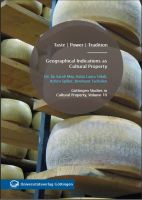Taste | Power | Tradition - Geographical Indications as Cultural Property
Contributor(s)
May, Sarah (editor)
Sidali, Katia Laura (editor)
Spiller, Achim (editor)
Tschofen, Bernhard (editor)
Language
EnglishAbstract
The idea of origin in terms of space and culture as a special indicator of quality is one of the most influential strands in contemporary food. It impacts on politics, economics and everyday life – and it connects these fields with complex relations of power and culture. With geographical indications, the EU offers an instrument which allows for the declaration of specialties, qualified by their tradition, as typical for a defined area. The declaration serves to protect these products as intellectual and collective property and presents them as culinary heritage, thereby enabling sale at an added value. Accordingly, the EU instrument of geographical indications evokes the interests of a variety of disciplines, such as (agricultural) economics, (social) geography, sociology, anthropology and law. Nonetheless, dialogue and cooperation among the disciplines are quite rare. “Taste | Power | Tradition” gives an insight into this multidisciplinary debate and brings together empirical data and theoretical reflections from different perspectives. The idea of origin in terms of space and culture as a special indicator of quality is one of the most influential strands in contemporary food. It impacts on politics, economics and everyday life – and it connects these fields with complex relations of power and culture. With geographical indications, the EU offers an instrument which allows for the declaration of specialties, qualified by their tradition, as typical for a defined area. The declaration serves to protect these products as intellectual and collective property and presents them as culinary heritage, thereby enabling sale at an added value. Accordingly, the EU instrument of geographical indications evokes the interests of a variety of disciplines, such as (agricultural) economics, (social) geography, sociology, anthropology and law. Nonetheless, dialogue and cooperation among the disciplines are quite rare. “Taste | Power | Tradition” gives an insight into this multidisciplinary debate and brings together empirical data and theoretical reflections from different perspectives.
Keywords
origin; indicator; culinary heritage; European Union; Geographical indications and traditional specialities in the European Union; Halloumi; PeruDOI
10.17875/gup2017-1004ISBN
9783863952082OCN
982239756Publisher
Universitätsverlag GöttingenPublication date and place
2017Classification
Society and Social Sciences


 Download
Download Web Shop
Web Shop